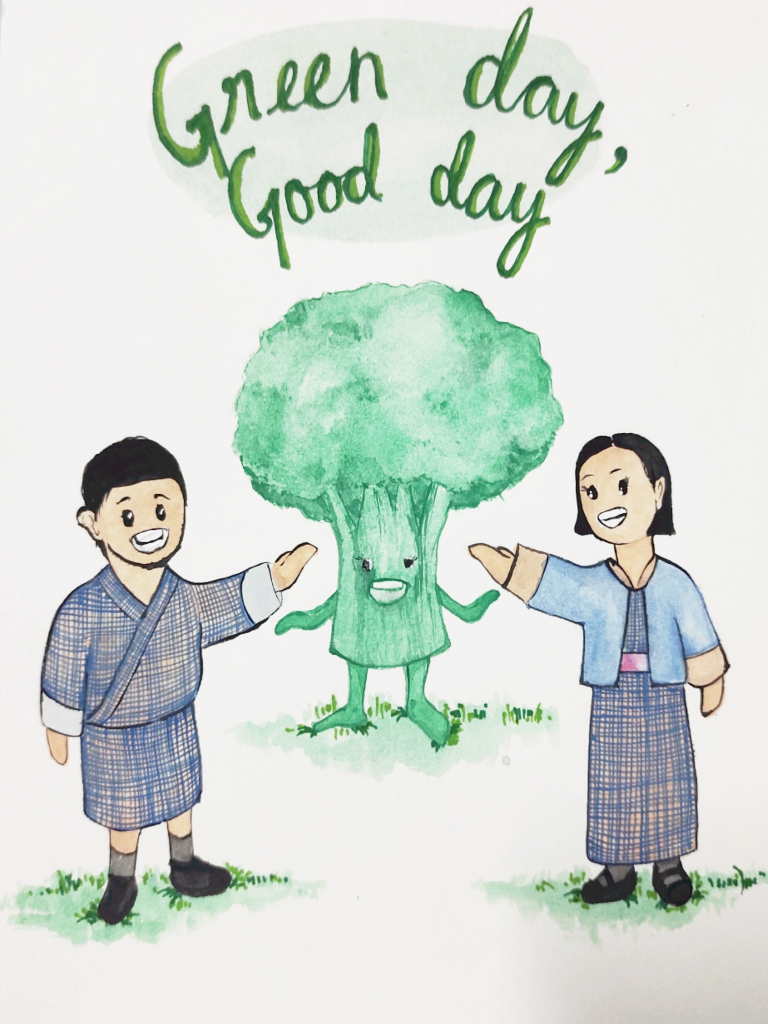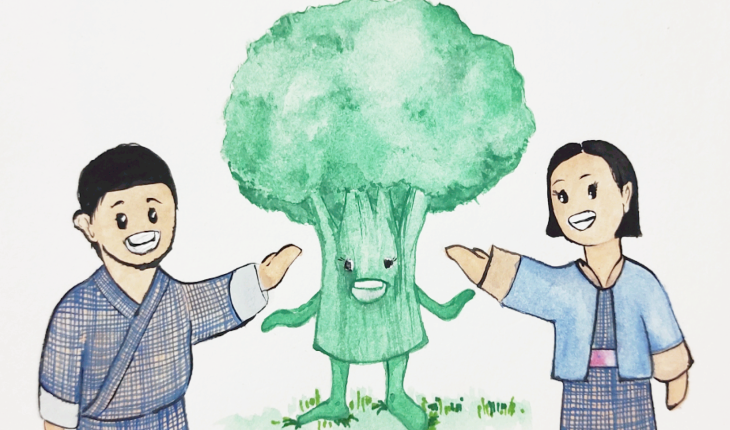
A children’s book rooted in school memories and healthy habits
KINZANG DORJI TSHERING
Thimphu
Simple Monday school ritual of carrying green vegetables has found new life in the form of a children’s book, Green Day, Good Day, written by Sonam Lhendup Woesel, a tourist guide who hopes to encourage a culture of healthy eating among young people.
The book is yet to be released but has already begun drawing interest from people who see in it both nostalgia and timely relevance.
Reflecting on his own childhood experiences, Woesel explained how the practice at his school became the seed of inspiration.
“Every Monday, we were required to bring green vegetables as our curry. At the time, it felt like a small rule, but looking back, I realize how much it taught us about eating healthy and maintaining good habits,” he said.
The author laments that such school practices have faded in recent years, something he noticed through his younger siblings and in conversations with students.
His book, he states, it is not just a story for children but a gentle call to action: a reminder that small routines can leave lasting impacts on health and well-being.
Woesel’s love for books began at Karma Academy, a boarding school where mobile phones were strictly prohibited.
“On weekends, we had very few distractions, so I picked up books. At first, it was just to pass time, but soon reading became something that brought me real joy,” he recalls.
That joy of reading eventually opened the door to writing.
His turning point came during his time at Royal Thimphu College (RTC), where he pursued English studies. A special moment for him was when celebrated Bhutanese author Kunzang Choden visited the college to talk to literature students.
“Listening to her speak about her journey as a writer, and how literature changes with time, really moved me. I walked away from that talk feeling like maybe I could write too,” Woesel said.
Although he had to leave college after his first semester due to personal reasons, he continued to write. Support from his parents, who read his work as if it were already perfect, and encouragement from tutors and friends kept him motivated.
His peers also contributed to the project by sharing their own memories of “green Mondays,” which enriched the storytelling.
The book’s illustrations were done by Tandin Zangmo, who offered her artwork free of charge.
“It was something I could not have afforded otherwise. Her generosity made this book possible,” Woesel said gratefully.
The anticipation around the book is already visible among those who have heard about it. Tashi, a college student, said Sonam’s effort to turn a simple school rule into a story is inspiring.
“Even before reading the book, I feel connected to the idea. We often forget how small things like eating vegetables can shape us. Sonam’s journey motivates me to take my own childhood habits more seriously,” he said, adding he is eager to read the book once it is released.
Another admirer, Pema, a primary school teacher, said she plans to use Green Day, Good Day as a resource for her students.
“I was really inspired by Sonam’s story because it connects so closely to childhood experiences. As a teacher, I see how much influence stories can have on children. Even though the book is not yet out, I am already thinking of ways to introduce a ‘Green Monday’ in my class once it is available,” she said.
“It may seem simple, but I believe children will learn healthy eating if we start early.”
For Woesel, Green Day, Good Day is more than just a book—it represents resilience, gratitude, and the power of community.
He recalls the support of friends who encouraged him during difficult days, the patience of tutors who guided him, and the artistic contribution of his illustrator.
Today, while he works as a tourist guide, he continues to pursue writing on the side.
His hope is that the book will not only reach children but also parents and teachers who play a critical role in shaping habits.
“It doesn’t take much,” he reflected. “One day a week, if families or schools encourage greens, that could change the way children grow up thinking about food.”
As anticipation builds around the release of Green Day, Good Day, Woesel’s journey itself has begun inspiring others.
His story is a reminder that even small beginnings—like carrying vegetables to school on a Monday—can plant seeds of lifelong wellness.





